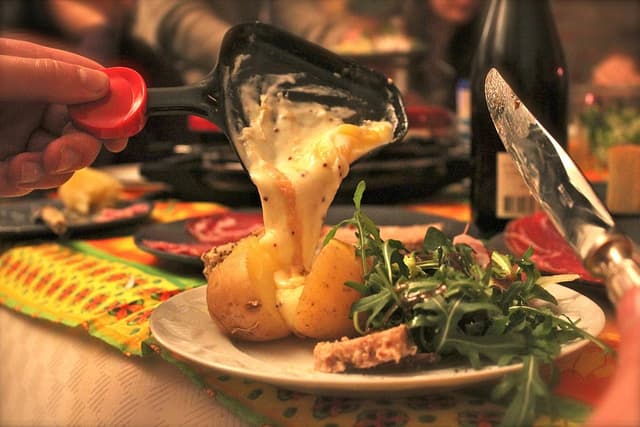France moves to protect Alps version of raclette from cheesy fakes

Pretenders to the (cheese) throne should fear Friday’s news that the Savoy raclette is now officially enshrined on the EU register of protected geographical indicators (PGI’s).
This means that the next time you order a “raclette de Savoie”, it must actually be produced in the Savoie department of eastern France.
Raclette cheeses masquerading as Savoy raclette are no longer safe as the melted cheese dish gets official recognition, meaning that anything labelled Savoy raclette must now actually use cheese from Savoy and hold up to a certain quality.
 (Jespah Joy)
(Jespah Joy)
The savoy version differentiates itself from its Swiss competitor “raclette Valais” from just over the border by its “slightly softer” texture, as well as a more “smooth and creamy flavour” according to site Cheese.com.
For the uninitiated, raclette comes from the French word “racler”, meaning to scrape. It’s a dish where a large cow’s milk cheese wheel is heated over a woodfire and the melted cheese scraped onto a plate usually consisting of potatoes, vegetables and meats.
By Rose Trigg
Comments
See Also
This means that the next time you order a “raclette de Savoie”, it must actually be produced in the Savoie department of eastern France.
Raclette cheeses masquerading as Savoy raclette are no longer safe as the melted cheese dish gets official recognition, meaning that anything labelled Savoy raclette must now actually use cheese from Savoy and hold up to a certain quality.
 (Jespah Joy)
(Jespah Joy)
The savoy version differentiates itself from its Swiss competitor “raclette Valais” from just over the border by its “slightly softer” texture, as well as a more “smooth and creamy flavour” according to site Cheese.com.
For the uninitiated, raclette comes from the French word “racler”, meaning to scrape. It’s a dish where a large cow’s milk cheese wheel is heated over a woodfire and the melted cheese scraped onto a plate usually consisting of potatoes, vegetables and meats.
By Rose Trigg
Join the conversation in our comments section below. Share your own views and experience and if you have a question or suggestion for our journalists then email us at [email protected].
Please keep comments civil, constructive and on topic – and make sure to read our terms of use before getting involved.
Please log in here to leave a comment.